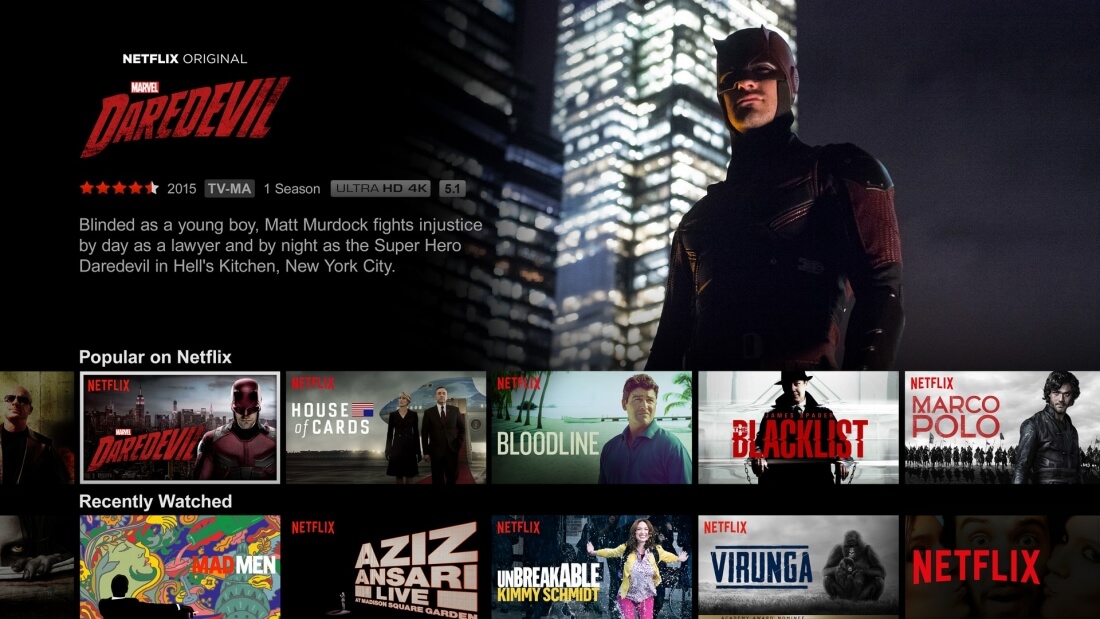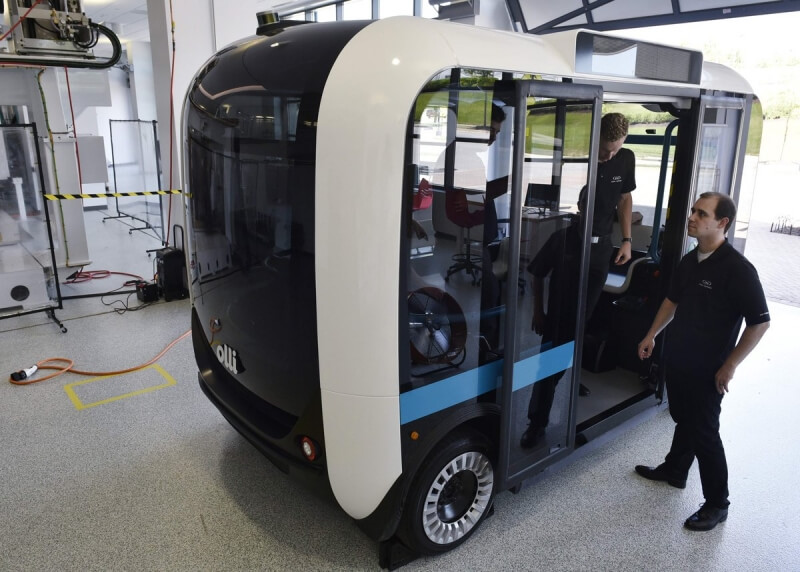Olli, a 3D printed, self-driving minibus, to hit the road in US A new maker of self-driving vehicles burst onto the scene Thursday in partnership with IBM's supercomputer platform Watson, and it's ready to roll right now. The vehicle – a 3D-printed minibus called "Olli" capable of carrying 12 people – was unveiled by Arizona-based startup Local Motors outside the US capital city Washington. Phys.org
Napster's improbable journey This week the Rhapsody music service announced that it will retire the Rhapsody name and re-brand its service (and the company) under the Napster brand. The Napster name has endured a long journey in the 17 years since Shawn Fanning first created the service in early 1999. I thought it might be helpful to put together a short history tracing that path. Medium
Scientists amplify light using sound on a silicon chip Yale scientists have found a way to greatly boost the intensity of light waves on a silicon microchip using the power of sound. Writing in the journal Nature Photonics, a team led by Peter Rakich describes a new waveguide system that harnesses the ability to precisely control the interaction of light and sound waves. This work solves a long-standing problem of how to utilize this interaction in a robust manner on a silicon chip as the basis for powerful new signal-processing technologies. Phys.org
Clean PC: Microsoft's refresh Windows tool can help make Windows 10 crapware-free Well, this is a welcome development. That Refresh Windows tool I discussed yesterday will be available from within Windows 10 going forward and will let users remove all of the crapware that comes with a new PC. Now that's progress. As I'm sure you know, I've been pushing the Clean PC mantra since January 2015, when Microsoft CEO Satya Nadella declared that he wanted users to love Windows 10. Well, this will certainly help. Thurrott.com
The geek behind Google's map quest Ed Parsons, Google's geographer-in-chief, is leaning over an 18th century woodcut map from the Chonhado, the Korean atlas of the world. Here, on thin parchment, the earth is a wobbly blue watercolor dot centered around the sacred Mount Meru, close to a large red circle representing Beijing. China and Korea make up the large part of the map, while the foreign lands beyond their borders are like afterthoughts, represented only by a thin peripheral strip of land. Fast Company

Can Netflix survive in the new world it created? One night in early January, a little after 9 o'clock, a dozen Netflix employees gathered in the cavernous Palazzo ballroom of the Venetian in Las Vegas. They had come to rehearse an announcement the company would be making the next morning at the Consumer Electronics Show, the tech industry's gigantic annual conference. The NY Times
How Yahoo derailed Tumblr Marissa Mayer was running late. This time, it wasn't for a dinner with skeptical advertisers nor a conference call with her inner circle of Yahoo executives. She was late for a rare meeting with much of the team at Tumblr, nearly two years after acquiring the startup for $1.1 billion. The biggest acquisition of Mayer's tenure as Yahoo CEO, Tumblr was supposed to revive Yahoo by broadening its audience and bolstering its long declining advertising business. Mashable
Every game at E3 2016 and its PC outlook E3 2016 was a massive event for the PC. More than any other year in recent memory, PC gaming permeated the show and conferences (Sony and Nintendo being the usual exceptions), and we're heading home from LA with over 40 games confirmed for or likely to come to PC. Here they are, with all the new trailers, mixed together for you to browse. We've certainly missed a few – our team is still at the show seeing everything they can on the last day – so we'll update this list as we get our hands on more games. PC Gamer
Eye-tracking system uses ordinary cellphone camera For the past 40 years, eye-tracking technology – which can determine where in a visual scene people are directing their gaze – has been widely used in psychological experiments and marketing research, but it's required pricey hardware that has kept it from finding consumer applications. Researchers at MIT's Computer Science and Artificial Intelligence Laboratory and the University of Georgia hope to change that, with software that can turn any smartphone into an eye-tracking device. MIT
A reprieve for Moore's law: milspec chip writes computing's next chapter At the front door of Raytheon's Integrated Air Defense Center, there's a reminder of how big microwave electronics used to be – the original microwave oven. The now ever-present kitchen device was invented after a Raytheon engineer discovered his candy bar melted while he was standing near a magnetron used in a radar system the company was developing. Ars Technica
Investigating Cavium's ThunderX: The first ARM server SoC with ambition When is a worthy alternative to Intel's Xeon finally going to appear? That is the burning question in the server world. If PowerPoint presentations from various ARM-based SoCs designers released earlier this decade were to be believed, Intel would now be fighting desperately to keep a foothold in the low end server market. But the ARM SoCs so far have always disappointed... AnandTech
Virtualizing around the FCC's firmware modification rules Last year, the FCC introduced new regulations requiring router manufacturers to implement software security to limit the power output in specific 5GHz bands. Government regulations follow the laws of unintended consequences, and the immediate fear surrounding this new directive from the FCC was that WiFi router manufacturers would make the easiest engineering decision. Hackaday
Reweaving the web Tim Berners-Lee ends "Weaving the Web", a book written in the late 1990s, on an optimistic note: "The experience of seeing the web take off by the grassroots effort of thousands gives me tremendous hope that...we can collectively make our world what we want." Nearly two decades later the inventor of the web no longer sounds as cheerful. "The problem is the dominance of one search engine, one big social network, one Twitter for micro-blogging," he declared on June 7th at a conference in San Francisco. Economist
Windows 10 vs. Ubuntu 16.04 graphics performance with Nvidia's GTX 1070 & GTX 1080 Lastly are some results of Unigine Heaven/Valley under Windows and Linux. Unigine continues being one of our favorite OpenGL benchmarks due to its great Linux support and the results further show that in comparing the numbers to Windows: Phoronix
